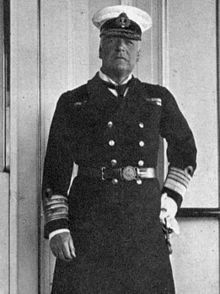The Lord Beresford | |
|---|---|
 Beresford, as pictured in Queen Alexandra's Christmas Gift Book, distributed for charity | |
| Personal details | |
| Born | 10 February 1846 Curraghmore, County Waterford, Ireland |
| Died | 6 September 1919 (aged 73) Berriedale, Caithness, Scotland |
| Political party | Conservative |
| Spouse | Ellen Jeromina Gardner |
| Awards | Knight Grand Cross of the Order of the Bath Knight Grand Cross of the Royal Victorian Order |
| Signature |  |
| Military service | |
| Allegiance | United Kingdom |
| Branch/service | Royal Navy |
| Years of service | 1859–1911 |
| Rank | Admiral |
| Commands | |
| Battles/wars | Urabi Revolt Gordon Relief Expedition |
Admiral Charles William de la Poer Beresford, 1st Baron Beresford, GCB, GCVO, FRSGS (10 February 1846 – 6 September 1919), styled Lord Charles Beresford between 1859 and 1916, was a British admiral and Member of Parliament.
Beresford was the second son of John Beresford, 4th Marquess of Waterford, thus despite his courtesy title as the younger son of a Marquess, he was still eligible to enter the House of Commons. He combined the two careers of the navy and a member of parliament, making a reputation as a hero in battle and champion of the navy in the House of Commons. He was a well-known and popular figure who courted publicity, widely known to the British public as "Charlie B". He was considered by many to be a personification of John Bull, indeed was normally accompanied by his trademark, a bulldog.
His later career was marked by a longstanding dispute with Admiral of the Fleet Sir John Fisher, over reforms championed by Fisher introducing new technology and sweeping away traditional practices. Fisher, slightly senior to Beresford and more successful, became a barrier to Beresford's rise to the highest office in the navy. Beresford rose to occupy the most senior sea commands, the Mediterranean and Channel fleets, but failed in his ambition to become First Sea Lord.